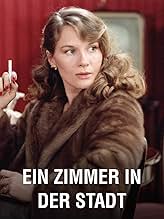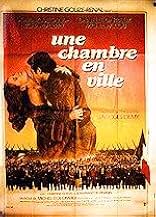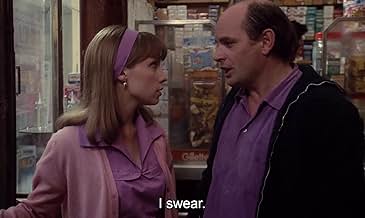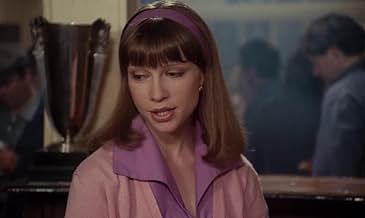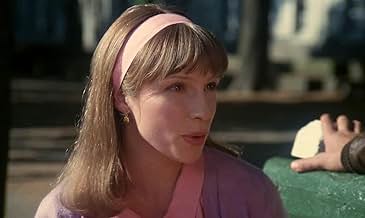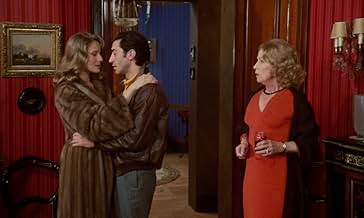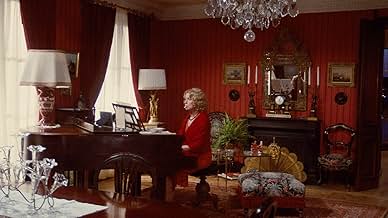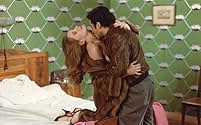Une chambre en ville
- 1982
- Tous publics
- 1h 30m
IMDb RATING
6.7/10
1.8K
YOUR RATING
Amid an ongoing workers' strike, a steelworker falls in love with the daughter of his baroness landlady, even though both are already in relationships.Amid an ongoing workers' strike, a steelworker falls in love with the daughter of his baroness landlady, even though both are already in relationships.Amid an ongoing workers' strike, a steelworker falls in love with the daughter of his baroness landlady, even though both are already in relationships.
- Awards
- 3 wins & 10 nominations total
Florence Davis
- Edith
- (singing voice)
- Director
- Writer
- All cast & crew
- Production, box office & more at IMDbPro
Featured reviews
How I never saw this movie and when the first line was spoken in singing way, I realize be treat a musical, not a classic musical as we get used to, just sung in every line, well it really weird to watch a movie, I love the ultimate musical "Les Miserables", taking in account the level of the budge they differ each other so much, "Une Chamble en Ville" is a small production a slow pace, sometimes still boring, nevertheless the story is great, the tragic tale took place at Nantes, during shipyard's strike (Which the French people loves to do) a humble worker François (Richard Berry) rent a room from a former Countess Margot (Danielle Darrieux) she has an unsatisfied married daughter Edith (Dominique Sanda in bold nudes scenes) due her husband Edmond (Michel Piccoli) actually is sexually impotent, in other hand François has been dating with Violette, who was pregnancy from him without notice by him, in fact François didn't love her, when he meets Edith the chemistry is overpowering and ends up in love night at cheap hotel, then all these facts are interwoven each other, a tragic tale sang on every line, fine movie, although it wasn't allowed to everyone!!!
Resume:
First watch: 2020 / How many: 1 / Source: DVD / Rating: 7.25
Resume:
First watch: 2020 / How many: 1 / Source: DVD / Rating: 7.25
I don't know what it was I expected from this film based on the premise, but by golly, it's not the movie I got. And I am so, so happy about that.
At its core this is a romantic drama set against the backdrop of unrest in Nantes as workers strike and the stooges of the establishment (some euphemistically call them police) enforce state violence. The story is built on very familiar ideas that we've seen in countless other romantic dramas before, and have since, and will again: a troubled landlady, a loveless and even abusive marriage, a relationship on the rocks, external factors adding to hardship, a beleaguered protagonist. That Jacques Demy penned this with a mind for including all this and more inherently places upper limits on suspension of disbelief and fosters the feeling of melodrama. Take into account the fact that one character is wearing nothing but a large overcoat for most of the length (at least twenty-four hours in-universe), the fact that the central romance is the result of a chance encounter and takes the course that it does, and final story beats in the last several minutes that I simply could not believe were actually what Demy consciously selected, and "melodrama" becomes an understatement. The best point of comparison is actually the soap opera, the peak of unending dramatic turns and over the top storytelling (unless you hop over to the next mountain range where Lifetime Original Movies and Horror or Sci-Fi B-Movies claim dominion). And not only is 'Une chambre en ville' a soap opera, but it's one in which every single line of dialogue is sung! It's not even that this adopts the recognizable structure of the average musical or opera, in which dialogue (whether spoken or sung) is interspersed among distinct songs or numbers; rather, this is just a romantic drama in which all lines are sung.
I don't think it's unfair to wonder if this really was exactly what Demy had intended from the get-go, but when you stop to think about it I can't imagine it was anything but. Such as it is the narrative is relatively unsophisticated and straightforward, and this and musical bent definitely amplify the sense of inauthenticity about the whole affair. At the same time, this was built from the ground up with absolute sincerity. The cast give genuinely admirable performances, with Dominique Sanda, Danielle Darrieux, Richard Berry, Jean-Francois Stévenin, and Fabienne Guyon (among others) standing out above even a notable figure like Michel Piccoli. The sets, filming locations, costume design, hair, makeup, stunts, and effects are truly outstanding, as fine as one could hope from most any picture. Though it sticks to the background behind the actors' singing, Michel Colombier's music is easy on the ears; Demy's direction and Jean Penzer's cinematography are rock solid, building shots and scenes with an undeniable expertise. Even for the slant that it ultimately follows, and the inclusion of plot points so tried and true they're basically tropes, Demy's writing - like all else here - could have just as easily been the foundation for an honest, serious drama. And yet all this was instead warped into a cheeky form that practically winks at the audience. There's no reason this should work as well as it does; indeed, I found myself filled with doubts at various points, given the overload of melodrama on hand. Yet as the finale irrevocably affirms how wholeheartedly Demy leaned into the bluster, I'd be plainly lying if I said I wasn't charmed.
'Une chambre en ville' is actually completely outrageous, a concept taken to a ham-fisted extreme that by all reason couldn't and shouldn't hold water. Nevertheless, it's wonderfully well made in every capacity, with the cast and crew having made excellent contributions. And while the overall tack is surely one that inspires love or hate with no middle ground, I for one am totally delighted by the end result. It's definitely a bit of a weird hodgepodge, but even for those who can't abide what Demy is doing here, I don't think there's much arguing that it's entertaining, whether in the best or worst of ways. I find myself conflicted; I don't know if it would be better for potential viewers to be well aware of what they're getting into with this, so as to prepare themselves, or if folks are better off being caught unaware as I was. All I know for sure is that I had a great time watching, and I would happily recommend 'Une chambre en ville' to just about anyone. It's a strange ride in some measure, but one that's very much worth taking.
At its core this is a romantic drama set against the backdrop of unrest in Nantes as workers strike and the stooges of the establishment (some euphemistically call them police) enforce state violence. The story is built on very familiar ideas that we've seen in countless other romantic dramas before, and have since, and will again: a troubled landlady, a loveless and even abusive marriage, a relationship on the rocks, external factors adding to hardship, a beleaguered protagonist. That Jacques Demy penned this with a mind for including all this and more inherently places upper limits on suspension of disbelief and fosters the feeling of melodrama. Take into account the fact that one character is wearing nothing but a large overcoat for most of the length (at least twenty-four hours in-universe), the fact that the central romance is the result of a chance encounter and takes the course that it does, and final story beats in the last several minutes that I simply could not believe were actually what Demy consciously selected, and "melodrama" becomes an understatement. The best point of comparison is actually the soap opera, the peak of unending dramatic turns and over the top storytelling (unless you hop over to the next mountain range where Lifetime Original Movies and Horror or Sci-Fi B-Movies claim dominion). And not only is 'Une chambre en ville' a soap opera, but it's one in which every single line of dialogue is sung! It's not even that this adopts the recognizable structure of the average musical or opera, in which dialogue (whether spoken or sung) is interspersed among distinct songs or numbers; rather, this is just a romantic drama in which all lines are sung.
I don't think it's unfair to wonder if this really was exactly what Demy had intended from the get-go, but when you stop to think about it I can't imagine it was anything but. Such as it is the narrative is relatively unsophisticated and straightforward, and this and musical bent definitely amplify the sense of inauthenticity about the whole affair. At the same time, this was built from the ground up with absolute sincerity. The cast give genuinely admirable performances, with Dominique Sanda, Danielle Darrieux, Richard Berry, Jean-Francois Stévenin, and Fabienne Guyon (among others) standing out above even a notable figure like Michel Piccoli. The sets, filming locations, costume design, hair, makeup, stunts, and effects are truly outstanding, as fine as one could hope from most any picture. Though it sticks to the background behind the actors' singing, Michel Colombier's music is easy on the ears; Demy's direction and Jean Penzer's cinematography are rock solid, building shots and scenes with an undeniable expertise. Even for the slant that it ultimately follows, and the inclusion of plot points so tried and true they're basically tropes, Demy's writing - like all else here - could have just as easily been the foundation for an honest, serious drama. And yet all this was instead warped into a cheeky form that practically winks at the audience. There's no reason this should work as well as it does; indeed, I found myself filled with doubts at various points, given the overload of melodrama on hand. Yet as the finale irrevocably affirms how wholeheartedly Demy leaned into the bluster, I'd be plainly lying if I said I wasn't charmed.
'Une chambre en ville' is actually completely outrageous, a concept taken to a ham-fisted extreme that by all reason couldn't and shouldn't hold water. Nevertheless, it's wonderfully well made in every capacity, with the cast and crew having made excellent contributions. And while the overall tack is surely one that inspires love or hate with no middle ground, I for one am totally delighted by the end result. It's definitely a bit of a weird hodgepodge, but even for those who can't abide what Demy is doing here, I don't think there's much arguing that it's entertaining, whether in the best or worst of ways. I find myself conflicted; I don't know if it would be better for potential viewers to be well aware of what they're getting into with this, so as to prepare themselves, or if folks are better off being caught unaware as I was. All I know for sure is that I had a great time watching, and I would happily recommend 'Une chambre en ville' to just about anyone. It's a strange ride in some measure, but one that's very much worth taking.
6hhg2
I checked out this movie because of Demy's earlier works, Lola (1961), The Umbrellas of Cherbourg (1964), and The Young Girls of Rochefort (1967), all of which I found charming and interesting. Demy has an unmistakable visual sense and makes expressive use of vivid color imagery. All of those films also had playful plot lines that did not always follow logic, order, or even reason. Instead a whimsical, airy feeling often permeated the films.
So, I do not expect, nor demand, that movies have precise plots that always follow order, but Une Chambre really tests that to the limit. The actions of the characters are mystifyingly foolish, as if they were undertaken by five-year-olds, with zero understanding of human emotions or consequences of action. Timelines are compressed beyond belief. This movie makes TV soap operas seem logical, rational, and reasonable! I found myself asking: did that character really do that? Did she really believe that would happen? On what planet might that actually take place.
On the plus side, the singing of dialog was interesting (and was used in his earlier films). The visual style was still strong. However, unless you are a film buff who requires to see all of a director's work, I'd suggest passing on this one. A rating of 6 might be generous, and I wrestled with giving it a 5, but I did like his other films.
So, I do not expect, nor demand, that movies have precise plots that always follow order, but Une Chambre really tests that to the limit. The actions of the characters are mystifyingly foolish, as if they were undertaken by five-year-olds, with zero understanding of human emotions or consequences of action. Timelines are compressed beyond belief. This movie makes TV soap operas seem logical, rational, and reasonable! I found myself asking: did that character really do that? Did she really believe that would happen? On what planet might that actually take place.
On the plus side, the singing of dialog was interesting (and was used in his earlier films). The visual style was still strong. However, unless you are a film buff who requires to see all of a director's work, I'd suggest passing on this one. A rating of 6 might be generous, and I wrestled with giving it a 5, but I did like his other films.
I had thought Jacques Demy had abandoned his movie operas after the 1960s, but no, he hadn't, and here's the proof. He's working with Colombier instead of LeGrand, and there's a lot more recitative, but unlike others who have tried to translate opera onto the screen, he has cinematographer Jean Penzer shoot it like a movie.... although Mme. Darrieux's flat does look like a stage design.
I do wonder if her daughter is wearing only a fur coat, as the dialogue indicates.
I do wonder if her daughter is wearing only a fur coat, as the dialogue indicates.
'Une chambre en ville' was thoroughly underrated from the start. In 1982 audiences no longer favoured tragic movies. BUT WHY? A generation earlier television had strongly reduced the audience of the cinemas. But television had NOT changed the taste. Video had a more profound influence. Take a standard situation. A group is watching a video which may evoke strong emotions in some of the spectators. Suddenly another catches the remote control, rewinds the movie and makes some comment (e.g., 'Girls should never have such a coiffure'). Repeated exposure to experiences of this kind may reduce the capacity for becoming emotionally aroused by movies. - Note that this is a recent development. It is easy to assemble a list of 100 very tragic movies produced 1935-1965, which at that time were highly appreciated by the average film-goer. I am even convinced that the average film-goer of this period would have loved contemporary movies such as 'Stormy Weather' (by Solveig Anspach) and 'Les diables' (by Christophe Ruggia).
If your aim is not emotional experience, you are likely to be disappointed by 'Une chambre en ville', despite its excellent merits. But please note that my review is one-sided and might be misleading. I intend to say much about the music, and shall reduce all other aspects to the bare minimum. What is the plot? Workers are striking. During a demonstration one of them (Francois) is shot by the police. He dies in the arms of his beloved (Edith). But only one day earlier he had abandoned his pregnant girlfriend (Violette), because he had met a very beautiful over-class girl. Francois and Edith were immediately overwhelmed by genuine and reciprocal passion.
Even among film musicals it is infrequent that every line is sung. Hence, it is natural to compare 'Une chambre en ville' with 'Les parapluis de Chèrbourg'. Jacques Demy directed both. But different composers (Michel Colombier and Michel Legrand) wrote the music. I think both got the manuscript most suitable for their specific talent.
The music of 'Une chambre' differs from that of 'Les parapluis' foremost in three respects. Without ceasing to be real film music, it is more introverted, and it is closer to opera music. But the largest difference is the director's relation to the singers.
Whenever two persons sing simultaneously in 'Les parapluis', you can clearly perceive the words of each. Also, simultaneous singing never transgresses the kind of dialogues that may be found in purely spoken theatre. By contrast, 'Une chambre' contains a real duet: the loving couple sings the same text together in parallel sixths; a device clearly borrowed from the opera. - - - To avoid misunderstanding as regards my next point: numerous great composers have borrowed melodies or other things from each other. Borrowing is not a fault if the borrowed thing is used for new purposes. Since 'Une chambre' finishes with a love scene in which one of the couple dies, it is not far-fetched to associate to Wagner's 'Tristan and Isolde'. During the final scene of the movie the main musical theme is presented for the fourth time, and this time with new accompanying melodies played by the orchestra. Rightly or wrongly, I think that these melodies are to some extent inspired by Wagner's opera (bar 63-73 of the overture).
Any competent musical conductor would tell the singers to take some impression of the mood of the text. But the soundtrack of 'Les parapluis' never differs much from a neutral performance. Hence, it is hardly possible to decide whether or not Jacques Demy actually directed the singers before the soundtrack was made. But in 'Une chambre' it could hardly be more manifest that Demy has devoted as much direction to the singers as to the actors seen on the screen. From Violette's singing voice alone, no one could mistake her distress when Francois abandons her, and her feeling of being treated unjust when Francois tries to excuse his behaviour. - - - Suppose you do not understand French, and that you are listening to the soundtracks of both movies without seeing the pictures. You will nevertheless have a fair chance of correctly perceiving the emotions of many scenes of 'Une chambre'. You will be much less successful with 'Les parapluis'.
If your aim is not emotional experience, you are likely to be disappointed by 'Une chambre en ville', despite its excellent merits. But please note that my review is one-sided and might be misleading. I intend to say much about the music, and shall reduce all other aspects to the bare minimum. What is the plot? Workers are striking. During a demonstration one of them (Francois) is shot by the police. He dies in the arms of his beloved (Edith). But only one day earlier he had abandoned his pregnant girlfriend (Violette), because he had met a very beautiful over-class girl. Francois and Edith were immediately overwhelmed by genuine and reciprocal passion.
Even among film musicals it is infrequent that every line is sung. Hence, it is natural to compare 'Une chambre en ville' with 'Les parapluis de Chèrbourg'. Jacques Demy directed both. But different composers (Michel Colombier and Michel Legrand) wrote the music. I think both got the manuscript most suitable for their specific talent.
The music of 'Une chambre' differs from that of 'Les parapluis' foremost in three respects. Without ceasing to be real film music, it is more introverted, and it is closer to opera music. But the largest difference is the director's relation to the singers.
Whenever two persons sing simultaneously in 'Les parapluis', you can clearly perceive the words of each. Also, simultaneous singing never transgresses the kind of dialogues that may be found in purely spoken theatre. By contrast, 'Une chambre' contains a real duet: the loving couple sings the same text together in parallel sixths; a device clearly borrowed from the opera. - - - To avoid misunderstanding as regards my next point: numerous great composers have borrowed melodies or other things from each other. Borrowing is not a fault if the borrowed thing is used for new purposes. Since 'Une chambre' finishes with a love scene in which one of the couple dies, it is not far-fetched to associate to Wagner's 'Tristan and Isolde'. During the final scene of the movie the main musical theme is presented for the fourth time, and this time with new accompanying melodies played by the orchestra. Rightly or wrongly, I think that these melodies are to some extent inspired by Wagner's opera (bar 63-73 of the overture).
Any competent musical conductor would tell the singers to take some impression of the mood of the text. But the soundtrack of 'Les parapluis' never differs much from a neutral performance. Hence, it is hardly possible to decide whether or not Jacques Demy actually directed the singers before the soundtrack was made. But in 'Une chambre' it could hardly be more manifest that Demy has devoted as much direction to the singers as to the actors seen on the screen. From Violette's singing voice alone, no one could mistake her distress when Francois abandons her, and her feeling of being treated unjust when Francois tries to excuse his behaviour. - - - Suppose you do not understand French, and that you are listening to the soundtracks of both movies without seeing the pictures. You will nevertheless have a fair chance of correctly perceiving the emotions of many scenes of 'Une chambre'. You will be much less successful with 'Les parapluis'.
Did you know
- TriviaDemy's longtime collaborator, composer Michel Legrand, strongly opposed the movie's social themes and urged the director to not do the movie. He ended up not being associated with the movie at all, and even in the 2010s, he was still trashing the movie in interviews.
- GoofsAround 01:11:53, Edith is holding a fire gun. Around 01:11:57, Edith is holding her bag and puts a tissue around her hand. However, she hasn't received a razor cut.
- Quotes
Madame Pelletier: [singing] You worry too much about me. Think of yourself first, of your own life. I've lived mine.
- ConnectionsFeatured in Jacquot de Nantes (1991)
- How long is A Room in Town?Powered by Alexa
Details
- Release date
- Country of origin
- Language
- Also known as
- A Room in Town
- Filming locations
- Place du Commerce, Nantes, Loire Atlantique, France(Where Violette goes to look for Guilbaud)
- Production companies
- See more company credits at IMDbPro
- Runtime1 hour 30 minutes
- Color
- Sound mix
- Aspect ratio
- 1.66 : 1
Contribute to this page
Suggest an edit or add missing content


![Bande-annonce [OV]](https://m.media-amazon.com/images/M/MV5BZGRhNTBmNzItZGNjMS00N2Y4LTkwODgtZjhjNTUxYjBiZmJmXkEyXkFqcGdeQXRyYW5zY29kZS13b3JrZmxvdw@@._V1_QL75_UX500_CR0)
